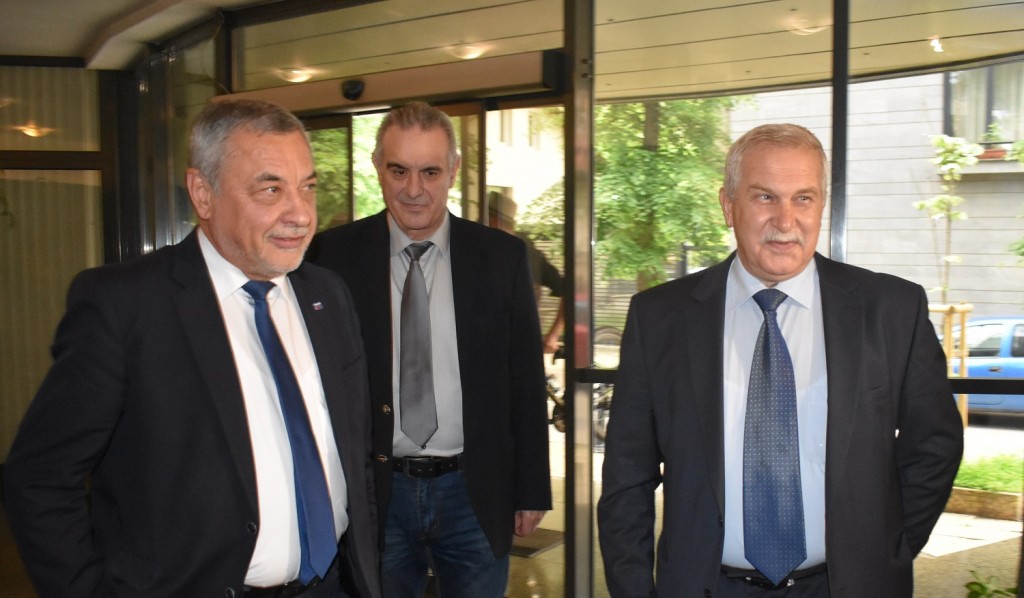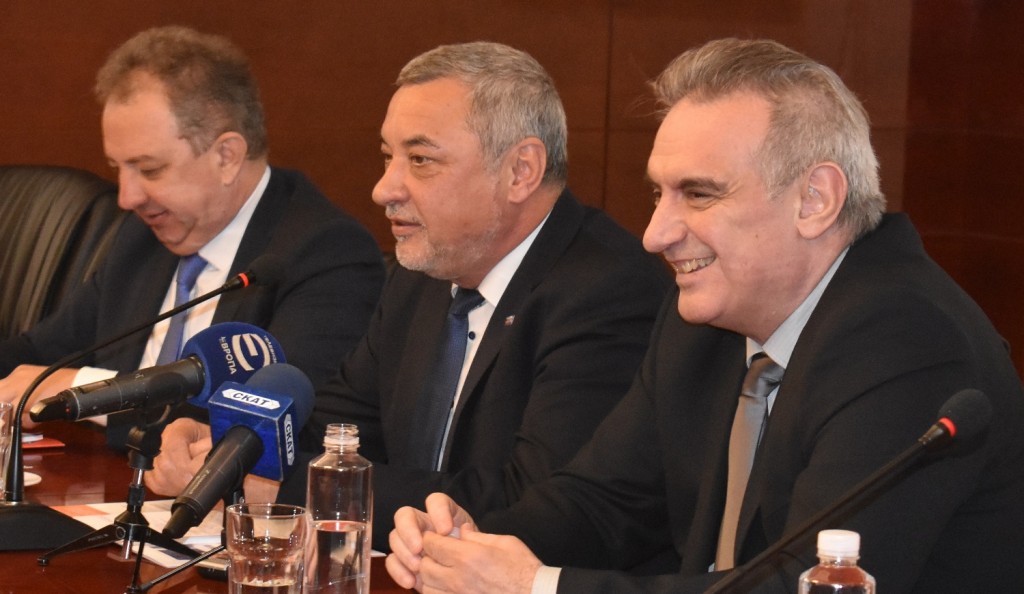- 74% believe that negative news is prevalent in the electronic media.
- 63% of the respondents want to learn about Bulgarian entrepreneurs!
- 39% of Bulgarians are of the opinion that it is possible to do successful business in our country, while 34% do not agree with it.
When asked what direction the Bulgarian economy was developing, 31% of the respondents said that it was developing in the positive and 49% in the negative.
Half of those surveyed were not informed about the country’s exports and cited the oil rose and dairy products as one of the most traded products, forgetting entirely about the electrical and mechanical engineering industries, which form the bulk of Bulgarian exports.
52% are of the opinion that Bulgarian exports as production are of high quality, while only 12% are of the opposite opinion. 36% do not know or cannot judge, which in turn indicates poor awareness.
This is shown by a national representative survey of the Trend Research Center presented today (18.11.2019) by Dimitar Ganev within the forum “Extracting the Success from Anonymity”, organized by the German-Bulgarian Chamber of Industry and Commerce, the Bulgarian Industrial Capital Association (BICA) and the Bulgarian Industrial Association (BIA). The forum is part of the campaign “Succeeding in Bulgaria!”, Which aims at achieving greater publicity for the successes of Bulgarian enterprises and entrepreneurs.
The discussion was attended by the chairmen of GBITK, BICA, BIA, CEM and the Bulgarian Public Relations Society, Deputy Chairman of the Parliamentary Committee on Culture and Media Toma Bykov, responsible representatives of the Union of Bulgarian National Electronic Media, the Bulgarian Business Leaders Forum , The Bulgarian Donor Forum, the Institute for Market Economics, sociologists, economic analysts, companies, NGOs and the media. The forum was moderated by Lydia Shouleva, Chief Coordinator of the Let’s Succeed in Bulgaria initiative and Chair of the Specialized Committee on Economic Development at the GIBC.
“The Bulgarian economy has emerged since the 19th century,” said Chief Economist of the Institute for Market Economy Lachezar Bogdanov. According to him, Bulgaria’s exports in the period 2008 – 2018 have undergone significant changes. In 10 years, the export growth of electrical equipment has increased more than three times, the trade in machinery – twice, and the export of the automobile industry – with a record six times. By comparison, in 2001 the main exports were clothing, knitwear and metals.
We offer excerpts from participants’ statements:
Mitko Vassilev, CEO of GBITK: The initiative “Succeed in Bulgaria!” Was provoked by the media’s failure to mention company names and to treat any company or brand name as a hidden advertisement. The problem that arises from this is multidimensional – the public is not provided with complete information and, on the other hand, a negative image of the country is being built, and the existing opportunities for realization in Bulgarian enterprises remain unnoticed. It is important to talk about the success of the companies, not only because of their contribution to the economy, but also because they serve as a positive example for future investors in Bulgaria. “One sees as much as one knows,” Goethe said.
Vassil Velev, Chairman of BICA: “Nothing is produced in Bulgaria. There is no industry in Bulgaria. ”This is what we most often read on social networks and listen on the streets. In fact, few Bulgarians know that Bulgaria is far above the European average in terms of industry share in gross value added. Few people know that the first items in Bulgarian exports are mechanical engineering and automotive and electrical and electronics – all sectors with high and medium value added. How many Bulgarians know companies that are Bulgarian and are the basis for national confidence and pride, which are in the TOP 10 in the world in their sector? Why is the negative in Bulgaria prevalent – is it more appealing to people? Why are success and good practices anonymous and problems named? Is there a problem with the law or is it censorship? And what kind of image of the country do we want to create? In general, is monogamy in Bulgaria a special religion? Is success an inspiring example, or is it cause for envy? If we listen to the news, it turns out that everyone is a mascara. These are questions that need to be answered.
Radosvet Radev, Chairman of the BIA: My general assessment is that this conversation is meaningful and slightly delayed in time. We have assurances from the Parliamentary Committee on Culture and the Media that the media law is being reconstructed and some regulations can be improved. As a media entrepreneur, I have tasted of both honey and tar of media law. In our media life, we have been sanctioned and unauthorized for mentioning good business practices, by brand names and companies. All major media outlets have a difficult task of reaching plans, covering audiences, etc., and they are related to the sale of advertising. There is a saying “If I announce that Company X has made people’s lives better, I will drop my marketing budget next month, so no mention!” However, I am convinced that there is no connection between the two – mentioning good examples will not reduce advertising revenue. Self-censorship is very important. All this long-standing chatter in regulatory practices has created high levels of self-censorship – not only in the media, in journalists, but also in television and radio broadcasters themselves. We have produced in media professionals the fear of saying the obvious. The implication of today’s forum is “Returning Freedom to Journalists!”
Lydia Shuleva, GBITK: I would like all of us who have gathered here today to unite, partner and seek success together and to exclude it from anonymity. Our goal is not to look guilty, but to look ahead, to unite and to realize that if we want to keep young people in Bulgaria, it is of great value to show success by name. Let’s see what is stopping us and what would help us to achieve this goal. We have no illusions that things will change from tomorrow, but if we do not speak clearly, frankly, with examples, we will not find the right way to change our moods. It is a difficult and long process.
Iravan Hira, Vice President of BBLF: BBLF was created more than 20 years ago at the initiative of Prince Charles on his visit to Bulgaria. At that time, about ten companies, mostly foreign investors, were members of BBLF. Today over 150 companies are members, over 80% of them are Bulgarian. They all seek to invest the best in society’s well-being. There is almost no Bulgarian company that is not involved in one way or another with corporate social responsibility. Over 80% of Bulgarian business is committed to helping society, but if you look at the media, you will see that 75-80% of society has a negative attitude towards business. A positive development is that in recent years 90% of CSR projects have been initiated by employees. In companies that are socially active, they have a high level of employee involvement, a low level of leaving, higher business results. The public is not aware of such stories because there are restrictions on mentioning the company. It is imperative that all companies that do good are anonymized. This is a discussion we owe. I am sure that if we talk more often about what good things are happening in our country, we will stimulate the business to engage, to help the society, to exchange good practices.
Krasimira Velichkova, Director of Bulgarian Donors’ Forum: Over BGN 37 million was donated by companies in Bulgaria in 2018. Just over 30% of Bulgarians think that business invests in social causes because they do not know what to do with their money. This shows a poll we did this year. Obviously, there is a lack of clarity in the media about the implementation of the Law on Radio and Television, because the law leaves many possibilities for interpretation, scares journalists and editors. Together with a group of non-governmental organizations, we prepared a specific text for changes in the LTA. We will hand the text to Mr Bykov. The idea is not to force the media to do something that is not in the public interest, but to legislate for clarity so that the public interest can be served. Because, as we have seen, people want to learn more about good examples. The regulator can also help by being part of this cause. Together, let’s campaign for journalists and editors to bring clarity so that journalists themselves do not self-censor. The media can also be helpful by being honest and, when they think a news is worth communicating to the public, present it with names. The media should inform the audience in good quality. Businesses are also obliged to society because they invest and do good things, but few companies provide adequate and complete information about their social investments. Businesses need to talk more, talk about their reasons for investing in society. Civic organizations can also do a great deal by telling what change they have made with a resource received from companies.
Kiril Valchev, Secretary General of SBNEM: There is indeed self-censorship, incl. in the interlocutors. As a presenter of The Week, I encourage them to tell themselves the businesses. On Saturday, I was visited by a representative of the Bulgarian-Swiss Chamber, who told how some children were staying at the Sens Hotel, but the translator translated “one hotel”. translators already have censorship. There is no dispute that there is no legislative problem. There are SEM methodical guidelines that clearly define what information is and what advertising is. The bigger problem is that we have a hopelessly outdated piece of legislation. Having a Radio and Television Act in 2020 in the presence of internet, social networks is inadequate. We can’t make an internet law. We have no law of the press. So, my first appeal is to repeal this Act (ZTT) and to regulate sensitive content (for children, harm, etc.) in other special laws – the Health Act, the Child Protection Act, the gambling, etc. Respectively – the control should be taken over by the respective regulatory authorities and closed by the CEM. It’s important to regulate content labeling as paid. The media themselves have been repeatedly accused of pursuing a policy focused on advertising, so they refuse to mention brands and businesses outside the so-called. paid reports. It should also be stressed that businesses often refuse to show because money loved silence. So it’s not very easy to get a businessman to visit you on the show. I call for the active involvement of the business itself in the media. Remove the ad regulations because it is already running on channels you cannot regulate, or Bulgaria should become North Korea. There should be a law on radio and television, but it should be a law on the BNT and the BNR, which should give a wonderful example of how everything that is spoken here is publicly pursued as a policy.
Lubomir Alamanov, Founder and Managing Director of SiteMedia: We are consultants, we help with strategic communications. The difference between advertising and PR is huge – we have nothing in common. PR is a managerial function, it is a function of transmitting information, it is not advertising, it is not product positioning, it is not marketing communications. Lack of communication often leads to the great crises we see every day. For example, thanks to Lidl, many Bulgarian manufacturers have changed their exports times to Western Europe. So economic information is important. It has nothing to do with advertising. In the past, there was an economic Plus Plus show, which provided an economic basis for the knowledge of the general public. At the moment, such a thing is almost impossible to happen because there are no examples. People’s financial education is lagging behind because they don’t have good examples. I agree that sometimes as communicators we overdo it. We teach students not to overdo it with adjectives (unique goods, unique services, unique…). We have a case where our press release was covered in 68 countries, and in our country only 2-3 media paid attention to it. What is a brand, what is a name? Mr Bykov’s name is also a brand. Tomorrow, if it makes a fashion line, is it already a politician’s name, is it a brand name, can it be mentioned? Is he a crazy name or is he a brand? Should every company have a representative in Parliament to mention her name? Mention of company names is a powerful weapon against fake news. Because they can more clearly identify who the speakers are, what they are saying, what is true, what is not. Providing information is not advertising. Advertising budgets will not stop.
Elena Valcheva, manager of PR agency Yanev & Yanev: Attempting to bring a confrontation between media and business is harmful. Recent studies have shown that as much as social networks have a strong influence on people, it is 20% and television’s impact is 70%. Televisions form images in people’s heads. How many of you have seen a working man on TV except in the reality show Farm? When TVs went into an enterprise to film the people who work there. If this image is regularly displayed, it is in the minds of the younger generations and they are striving for it. And we lost that image. It is the lost image of prosperity, of a prosperous person, of one who achieves something through his work. Then we wonder why we are the most unhappy nation. One is happy to create something. The conversation is very important and very serious measures must be taken very quickly, so the most influential media should help the Bulgarian nation to believe that things are going better here.
Rosita Elenova, President of CEM: I am positive that CEM does not have divergent practices on the topic we are discussing today. There is no sanctioned media to properly mention a brand for information purposes. We are united in a common mission when there is positive news that the media does not bother to show it. However, there is serious self-censorship. The guests themselves are censoring themselves. This is where the most accurate organizations and personalities are gathered. I am very involved with SEM and myself with this topic. If Coca Cola has opened a factory, it must be said that Coca Cola has opened a factory. This CEM staff tolerates the creation of an economic broadcast on public television. There is a lack of economic broadcasts, this is a huge deficiency in the media environment.
Iliana Zaharieva, Chairman of BDVO and Director of Communications of A1: Forgive me for being skeptical, but personally I have been involved in this process for at least five years. We may be the right people here at this table, but where are bTV and Nova TV? Everything that has been said so far is true. Yes, there are methodological guidelines for SEM. Yes, there is no regulatory problem. But there is a real problem. For example, we are talking about the involvement of A1’s CEO, but they couldn’t say who he was, they couldn’t mention the company. What do you know about 5G, have you ever been told something on TV how 5G will change your life, how remote medicine will be, how telecoms work on it? No, they show you any Golds, but they don’t tell you about 5G. Self-censorship is scary – it is on the part of journalists, presenters and guests. Only a huge campaign can help educate these people – journalists, presenters, guests, editors, TV owners. I am disgusted with this environment.
Toma Bykov, Deputy Chairman of the Committee on Culture and Media at the 44th National Assembly: Our task is not easy, because obviously we have to deal with a number of myths. The biggest myth is that the law is guilty. The law does not prevent anyone from reporting facts. When we open to changes in the law, I am sure that this amendment will not be dramatic and we will adopt it by consensus. I hope with your help to write in the law as clearly as possible what a media can and cannot do. The bigger problem is that it will be difficult to deal with other myths, for example – the myth of who is successful and who is unsuccessful businessman. As a matter of fact, in Bulgaria the image of a businessman is person in suit, a Mercedes and a folk friend, not someone who produces modern technology. Televisions are full of this type of business, and I don’t see any hiding there from hidden advertising. There is a hidden advertisement – for example, in many programs there are nutritionists, massage therapists, astrologers, fitness instructors … Do you know how this type of service increases the consumption? Private media are also business organizations and are looking for profit, but we need to set a common standard for what a successful business is – that it means making efforts, not getting rich quick. The media should start reflecting facts rather than launching half-criminals by presenting them as business representatives. And these people are giving people what is good and what’s bad. This is a public function of the media – to show the good and the bad, to set the standards. The law alone will not fix things. The law on radio and television is important and covers a wide range of topics, but it is a totally outdated, inadequate law – the media is seen as a post-socialist enterprise. That is why the public media are following this pattern and are about to go bankrupt. So there is a need for this law, but it needs to be seriously revised. It is the political will to support such changes. The media should not be penalized for reporting facts. I call on the media, whatever the law, to report the facts. Because it is hypocritical to claim that we are fighting false news, provided we devise common constructs to circumvent reporting of certain facts.
Ognyan Trayanov, owner of TechnoLogica: When it says who the guest is and what his position is, it shows the viewer / listener what his competence is on the topic, but also his interests, etc. this is a means of filtering out hidden advertising. A responsible business, when it comes to CSR, does not need a PR. It is a shame for us to say that we do CSR as an indulgence. When any media pushes us to pay for CSR coverage, we cannot take it for granted. We are doing something that is useful to society, and we cannot afford to pay it to come out that we are doing it all for a PR. This is unacceptable. It is clear that these excuses with CEM sanctions when it comes to some positive action, activity, example, that is business violence to pay for advertising. The public media is not to compensate for the lack of other media, but to focus some necessary activities that are not beneficial to the private media.
***


 English
English









 Dr. Hassan Ademov, Chairman of Committee on Labor, Social and Demographic Policy, Executive Director of EA General Inspectorate of Labor Eng. Rumyana Mihailova, Deputy Regional Governor of Plovdibabour 13v Evelina Apostolova, representatives of Ministry of Health participated in the international forum. Ministry of Labor and Social Policy, Bulgarian Medical Association and over 100 international and Bulgarian experts on health prevention.
Dr. Hassan Ademov, Chairman of Committee on Labor, Social and Demographic Policy, Executive Director of EA General Inspectorate of Labor Eng. Rumyana Mihailova, Deputy Regional Governor of Plovdibabour 13v Evelina Apostolova, representatives of Ministry of Health participated in the international forum. Ministry of Labor and Social Policy, Bulgarian Medical Association and over 100 international and Bulgarian experts on health prevention.





